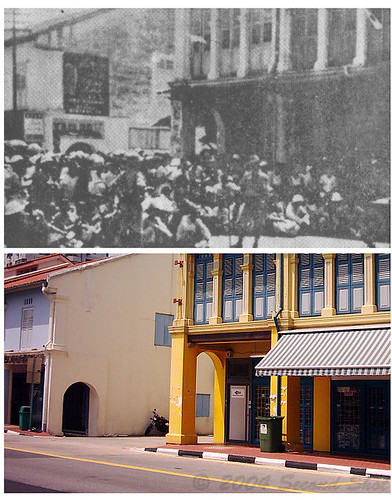2012 is a special year. Even though the nation observes Total Defence Day every Feb 15 and for some, remembrance day at Kranji, this year happens to be the 70th anniversary of the Fall of Singapore. NHB has a series of events lined up under the heading "70th Anniversary of the Battle for Singapore, 1941-1942". I do note the nationalistic spin on it, the "Battle for Singapore" instead of "Fall of Singapore", though some events actually use the latter title so we have a little consistency issue here. Many netizens recounted the events from Pearl Harbor, which brought Japan into war with Britain and USA, and the landing on and attack down Malaya which finally culminated in the Fall of Singapore, the greatest military defeat in British history. For most people, the commemoration ends on Feb 15, though some may still visit the museums (free admission to Bukit Chandu, Ford Factory and History Gallery at NMS from 13 to 19 Feb) and the Four Days in Feb exhibition at the National Library. For the folks in February 1942, however, this was only the beginning, of the 3 years 8 months living under Japanese rule on Syonan-to. For many, it would be a nightmare.
The nightmare started on 18 Feb.
Sook Ching, meaning to purge through purification, was an attempt by the Japanese to remove all suspected of being anti-Japanese amongst the Chinese population. On the third day after the British surrendered, the Japanese Military Police, the Kempeitai, issued an order to have all Chinese males to assemble at designated mass-screening centres. [link]
The rest, as they say, is history. Operation Sook Ching (in Japanese シンガポール大検証 Shingapōru Daikenshō) brought the half-century Sino-Japanese feud to the shores of Singapore, set the stage of three and a half years of Japanese rule and broke any notion of Japan as liberator from the colonial powers espoused in their concept of Greater East Asia Co-Prosperity Sphere.
















4 comments:
Never forget the horrible 3-years-8-months occupation!
i still have resentment against the Japanese now, especially when they still refuse to acknowledge their past deeds and try to cover up
it was the turning point of my family when my grandfather was rounded up and machine gunned-down at Changi beach
May there be world peace forever
Hi Anon, so sorry to hear about your grandfather. Indeed their refusal to formally acknowledge their atrocities leave a black mark on what is otherwise a respectable nation who gave us much of modern technology. A big price was paid for their misdeeds, if the Hiroshima and Nagasaki bombings were anything to go by.
It is unfortunate that *some* Japanese individuals are still in denial mode about their forebears' role in WWII. However, I do not harbour any resentment towards the Japanese people.
Like Anon, my father's father was killed in S'pore during WWII. As a result, my father never met his father, or his sole elder sister (who was subsequently given up for adoption).
In Surabaya Indonesia, my mother's father (a school principal) was imprisoned by the Japanese Army for having wushu swords in the school. The arrest kicked off an unfortunate chain of events that saw my mother being given up for adoption, & then forcibly shipped to S'pore after the war.
To this day, I have no idea who or where my blood kin are. My family tree is just 1 short line -- followed by a nebulous & untraceable nothing. Isn't it funny what war can do ...
Hi Pat, so sorry to hear about your grandfather and family. I blogged about my visit to City Hall before it was closed, how the Japanese visitors did not betray their emotions when shown a photo of the surrender ceremony. I'm not sure how they see their war dead - glorious dead - in the Japanese cemetery either.
Post a Comment